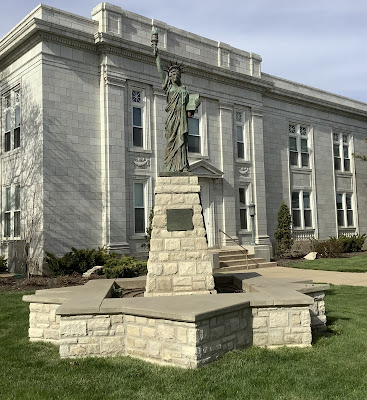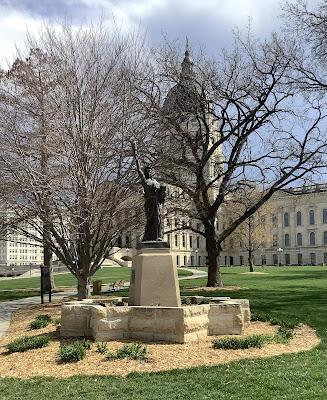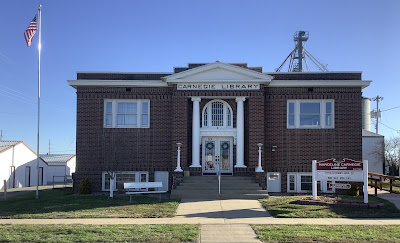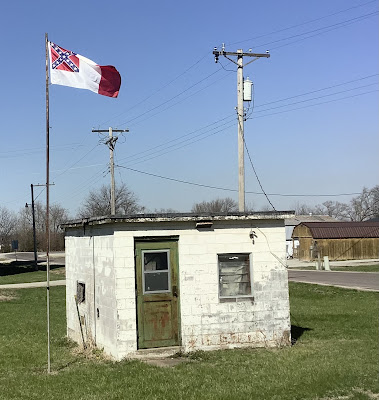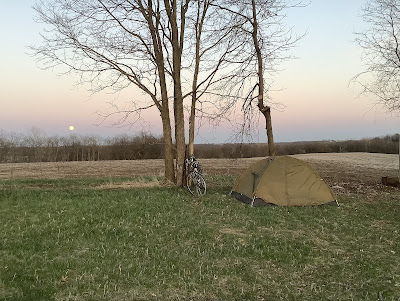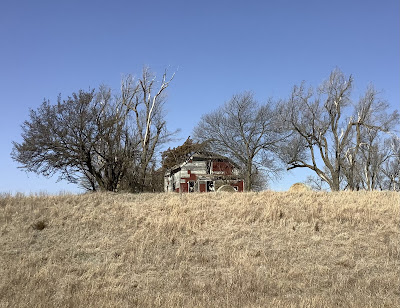I was the beneficiary of several Easter offerings, though I’m not sure if all were related to Easter. The first came when I was sitting outside against the wall of a Casey’s General Store eating a peanut butter sandwich, something that I wasn't to do very often earlier in these travels when it was so cold. A young man wearing shorts, maybe nineteen or twenty, approached and said, “Nice day isn’t it?” I agreed, saying, “It’s a good day to be on the bike.”
He didn’t ask where I was going, evidently taking me for a transient and not a traveler. Instead he said somewhat sheepishly, “I don’t have much, but I’d like to give you this,” and handed me a plastic bag filled with coins. “No, no,” I resisted, “I’m fine.” He walked away a little disappointed.
A couple minutes later he returned and said, “Could I offer a prayer for you?” “Sure,” I said. He began, “Dear Lord, look after this man and help him make the right choices,” and continued for a minute or two and then presented me with the coins again. This time I accepted.
A couple hours later when I jettisoned the majority of the weight of those coins at a MacDonalds for the two McChickens special, a thirty-year old guy came to my table and said, “Happy Easter,” and handed me a ten dollar bill. I don’t know if he saw me counting out and stacking all the coins at the cash register, most of which were pennies, for my meal, or if it was my overloaded bike that inspired his kind-heartedness, but I appreciated the gesture.
Later that night in my tent I dined on a bounteous Easter dinner compliments of ALDIs—a genuine feast of Bob Evans macaroni and cheese, hummus, shredded Monterrey jack cheese, sliced ham, apple sauce, yogurt, and cheesecake. I couldn’t wait to get to my tent and start gorging. I was within the sprawl of Kansas City after crossing back into Kansas in Leavenworth.
He didn’t ask where I was going, evidently taking me for a transient and not a traveler. Instead he said somewhat sheepishly, “I don’t have much, but I’d like to give you this,” and handed me a plastic bag filled with coins. “No, no,” I resisted, “I’m fine.” He walked away a little disappointed.
A couple minutes later he returned and said, “Could I offer a prayer for you?” “Sure,” I said. He began, “Dear Lord, look after this man and help him make the right choices,” and continued for a minute or two and then presented me with the coins again. This time I accepted.
A couple hours later when I jettisoned the majority of the weight of those coins at a MacDonalds for the two McChickens special, a thirty-year old guy came to my table and said, “Happy Easter,” and handed me a ten dollar bill. I don’t know if he saw me counting out and stacking all the coins at the cash register, most of which were pennies, for my meal, or if it was my overloaded bike that inspired his kind-heartedness, but I appreciated the gesture.
Later that night in my tent I dined on a bounteous Easter dinner compliments of ALDIs—a genuine feast of Bob Evans macaroni and cheese, hummus, shredded Monterrey jack cheese, sliced ham, apple sauce, yogurt, and cheesecake. I couldn’t wait to get to my tent and start gorging. I was within the sprawl of Kansas City after crossing back into Kansas in Leavenworth.
Leavenworth’s City Hall. It shared the grounds with a statue of Lincoln. He was honored, as he had honored Leavenworth with the first speech of his presidential campaign on December 3, 1859. He had come to Leavenworth, as Kansas had voted to be an anti-slave state. He was gratified it hadn’t joined the slave states and with slavery the key issue in the election kicking off his campaign in a state that had sided with his views couldn’t have been more symbolic.
The new library a couple blocks away filled nearly a full block in this university town. Rather than students, it was aswarm with transients inside and out. I was leery of leaving my bike out front where many were hanging out having had a sleeping bag and tent pilfered off my bike in similar circumstances. I circled the library to see if there was a window I could park it by so I could keep an eye on it. I couldn’t find one, but settled on the rear entrance near an open door where people could drop off donations. The guy who drove the Bookmobile parked nearby said it would be fine there.
As with Manhattan, home of Kansas State University, that I passed through last Sunday, the streets of Lawrence were filled with Kansas students driving aggressively, coming to stop signs and speeding up without coming to a complete stop and showing no deference to the lone cyclist on their streets.
It was twenty-seven miles to the next Carnegie in Topeka, the state capital. I feared the traffic might be thick and steady between these two cities, but after five miles of mayhem, I had the road pretty much to myself as the bulk of the traffic was on Interstate 70, linking the two cities.
I was tempted to take advantage of a cheap motel on the outskirts of Topeka, but it was sixty miles due south to the next Carnegie in Burlington and the forecast for the next day was a strong south wind. At present it was just a light breeze, so I passed on the opportunity for a shower and knocked off a few of those sixty miles when they wouldn’t be so hard to come by.



